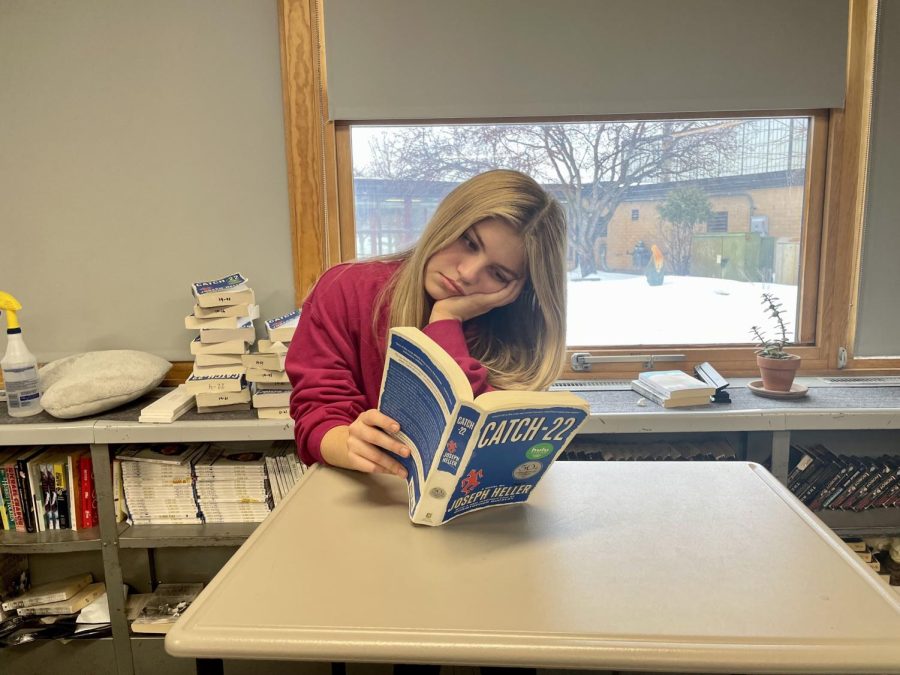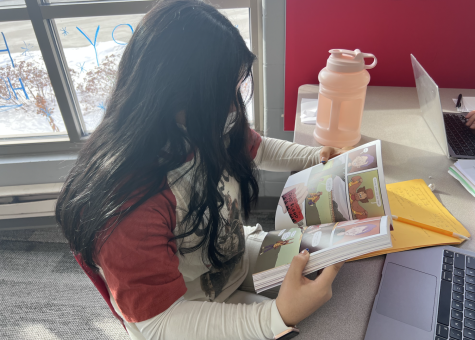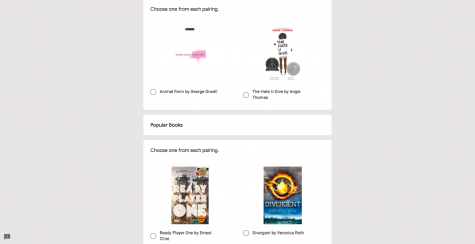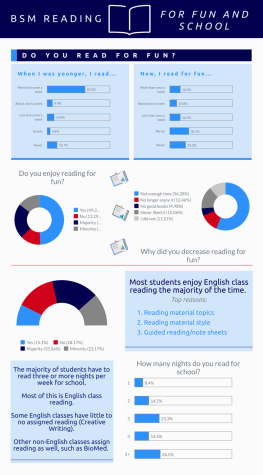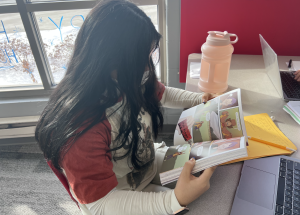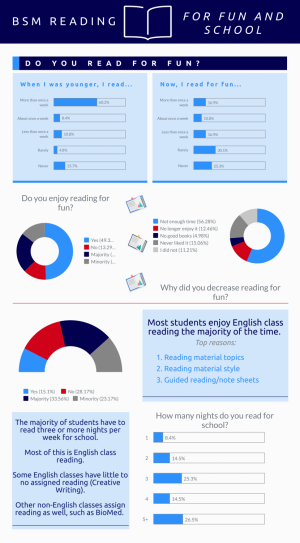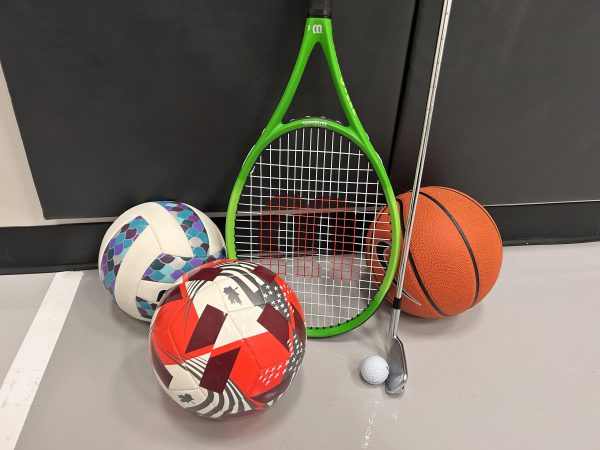Students Are Still Struggling To Read
Members of BSM’s reading cohort are working to solve problems in reading comprehension.
March 17, 2023
Last year, the Knight Errant reported on students struggling with reading comprehension. Across all subject matters, teachers found that students were unable to synthesize information and formulate ideas compared to decades ago.
Now, this struggle is reflected in standardized test scores. BSM students (and students taking standardized tests nationally) struggled on the PSAT assessment, especially in the reading sections. “The juniors took a practice SAT… and it does show that we have dropped some in reading. No surprise after the pandemic,” Principal Stephanie Nitchals said.
Although some of this decline can be attributed to the pandemic, it is also part of a greater cultural problem. Students are reading less outside of the classroom, and they’re missing out on key background information that helps with reading comprehension.
“The trend definitely seems to be that reading and comprehension skills are not as strong as they were five years ago…I think a lot of this has to do with very few students who do a whole lot of reading outside of class anymore. The more you read, the better you get at it,” Social Studies teacher Cherie Vroman said.
Reading helps students succeed academically, but it also builds character and general knowledge. “Reading is so important because it builds our empathy and it’s how a lot of humans communicate their ideas,” Theology teacher Katrina Garcia-Eveloff said.
This problem not only hurts standardized test scores; it hurts students preparing for college and the workforce. As a college prep school, BSM’s primary focus is equipping students with skills for college, including reading comprehension. “As a college prep school, we owe it to students to try and teach them to read and write in a way that sets them up for success,” Garcia-Eveloff said.
In addition to reading proficiently, reading gives students the knowledge base to succeed in the future.
“The expectation is in most colleges that you can read and you will read on your own. I think it’s overlooked a lot…you need the essential background knowledge base and understanding that you want to build throughout your entire educational career,” Vroman said.
This year, BSM is taking steps to mitigate these reading problems. Nitchals created a reading cohort (open to all faculty) as a forum to discuss reading comprehension issues and possible solutions.
“We’re meeting weekly to talk about some reading strategies we can implement here at school…We started by talking about how much and how often students are reading. What are they reading? What’s being assigned, but how much are they actually reading?” Nitchals said.
Members of the cohort are developing strategies to sharpen students’ academic skills, assign more reading across departments, reduce grade inflation, and encourage students to read in their free time. Because this is a multifaceted problem, it will require a few different solutions.
“I think because reading involves so many skills and capabilities, there’s been a lot of ideas thrown out..how can we get common language around the skills that students should be getting by grade,” Garcia-Eveloff said.
Supporting students who are behind in reading comprehension is a difficult task, so the reading cohort is also hoping to help teachers with heavy grading loads. “[We have] ideas around how to support teachers who are doing the labor intensive work of grading, responding to, and helping students with reading and writing. Also looking at grading policies…that may or may not be encouraging or discouraging students from reading,” Garcia-Eveloff said.
We’ve talked about how we can build a time during the school week where we’re encouraging students to read and bring a book or to share ideas of what students might like to read, to build a culture where reading is seen and the joys of reading are encouraged. One idea that’s been floated is making reading a part of freshman study hall,
— Katrina Garcia-Eveloff
Although the reading cohort is a positive step, it may not be enough to raise reading comprehension. “Schools are never going to be able to completely solve this because there is an element of, ‘what you are doing outside of the school day?’” Vroman said.
Even though the administration can’t control students reading outside of school, they can encourage students to read independently during study hall or homeroom.
“We’ve talked about how we can build a time during the school week where we’re encouraging students to read and bring a book or to share ideas of what students might like to read, to build a culture where reading is seen and the joys of reading are encouraged. One idea that’s been floated is making reading a part of freshman study hall,” Garcia-Eveloff said.
Hopefully, reading independently in these spaces will remind students that reading is fun. “[Reading] is also fun right? It opens up lots of different experiences that may not have a chance to see. It can be an escape for a little while and it can entertain you…make you laugh, make you cry, go through whatever emotions you might need to go through. There’s a lot of benefit to that too,” Librarian Laura Sylvester said.
Teachers can spread enthusiasm about reading by sharing their own recommendations. “I would love for more teachers to share their reading experience…Mr. Groess has on his door what he’s reading, and just teachers sharing, ‘yeah I read this book’ and engaging so that students can see people read outside [of school],” Sylvester said.
Along the same lines, the reading cohort is asking teachers to send students to the library for time to read.
“Even the last couple weeks, ninth grade teachers have been either bringing students to the library or we’ve been bringing the library to them and they are dedicating class time to letting students read just for fun. That’s what a lot of research suggests is great. What I’d love to see is giving students time because I think that’s one of the many things that prevents them from reading for pleasure,” Sylvester said.











































